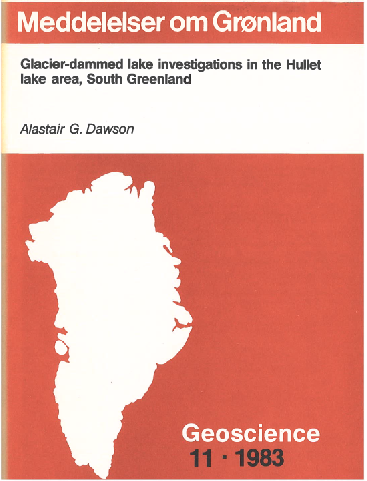Glacier-dammed lake investigations in the Hullet lake area, South Greenland
DOI:
https://doi.org/10.7146/moggeosci.v11i.139671Abstract
Results are presented on the evolution of former glacier-dammed lakes and on former glacier oscillations in the Hullet lake area, South Greenland. In this area, the presence of 15 well-developed lake shorelines between 684 and 570 m a.s.l. indicate a complex sequence of Neoglacial lake level changes, several of which may have been associated with catastrophic lake drainage and the rapid emptying of lake waters through a c. 23 km subglacial tunnel beneath Sydgletscher and the Kiagtût sermiat glacier. The oldest lake had a volume of c. 950 x 106 m3 and its sudden drainage resulted in local neotectonic crustal deformation. Lichen measurements of Rhizocarpon geographicum on glacial moraine debris suggest that a major Neoglacial expansion of glacier ice had taken place by c. 2350 years B. P. and was followed by widespread ice retreat and stagnation. There is no evidence to indicate an expansion of glacier ice in the Hullet area during the Little Ice Age. The progressive retreat of Sydgletscher was accompanied by the formation of a series of ice-dammed lakes each of which was drained subglacially. The drainage of the lakes is suggested as having been both a slow and a rapid (jökulhlaup) process. Evidence of slow lake drainage is illustrated by the last lake drainage event that took place during October 1981. During this period c. 60% of the volume of lake water drained slowly over a 14 day period with an average discharge of c. 200 m3s-1.

Downloads
Published
How to Cite
Issue
Section
License
Coypyright by the authors and the Commision for Scientific Research in Greenland / Danish Polar Center. No parts of the publications may be reproduced in any form without the written permission by the copyright owners.

